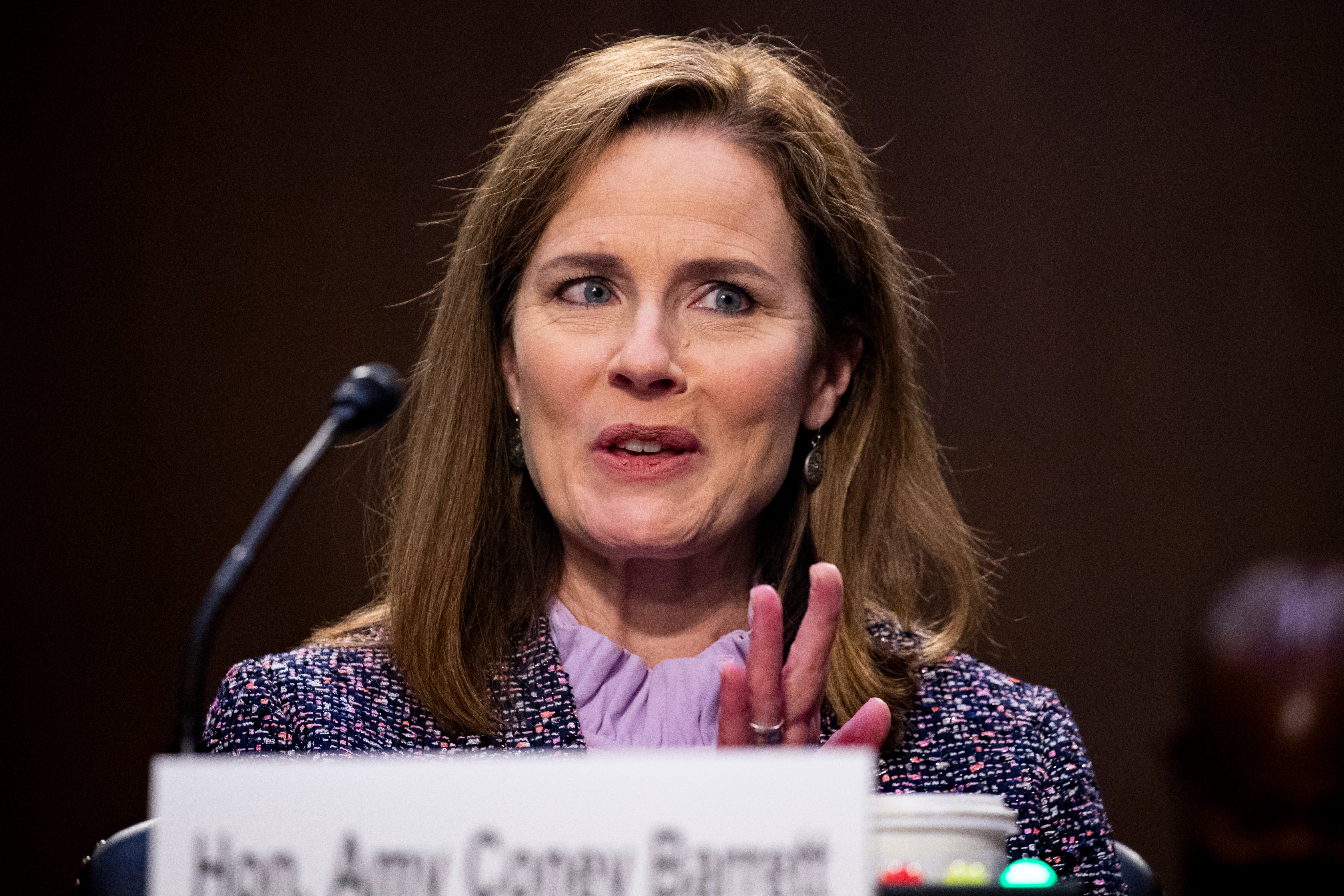Takeaways: Barrett tells senators 'no one is above the law'
Supreme Court nominee Amy Coney Barrett is facing second day of questions from the Senate Judiciary Committee as Democrats keep the focus on health care three weeks before the Nov. 3 election

Your support helps us to tell the story
From reproductive rights to climate change to Big Tech, The Independent is on the ground when the story is developing. Whether it's investigating the financials of Elon Musk's pro-Trump PAC or producing our latest documentary, 'The A Word', which shines a light on the American women fighting for reproductive rights, we know how important it is to parse out the facts from the messaging.
At such a critical moment in US history, we need reporters on the ground. Your donation allows us to keep sending journalists to speak to both sides of the story.
The Independent is trusted by Americans across the entire political spectrum. And unlike many other quality news outlets, we choose not to lock Americans out of our reporting and analysis with paywalls. We believe quality journalism should be available to everyone, paid for by those who can afford it.
Your support makes all the difference.Supreme Court nominee Amy Coney Barrett faced a second day of questions Wednesday from the Senate Judiciary Committee as Democrats kept up their focus on health care three weeks before the Nov. 3 presidential election.
Barrett again avoided taking positions on a variety of subjects and rulings, saying it would be inappropriate to comment on cases that may come before her as a justice. Republicans appear on track to push ahead with her confirmation before the election.
Takeaways from Day Three of the hearing:
HEALTH CARE PLAYS A STARRING ROLE — AGAIN
Democrats again pressed Barrett over her views on the Affordable Care Act, noting that President Donald Trump has made clear he wishes to undo the Obama-era health law. Democrats say Trump and Senate Republicans are rushing to confirm Barrett so she can be seated in time to hear a case next month challenging that law.
Sen. Dick Durbin, D-Ill., said there’s an “orange cloud” hanging over Barrett's nomination — a political jab at Trump's tan and a reference to the president's oft-stated wish to overturn “Obamacare.”
Barrett told senators she is not “hostile” to the law and promised to consider all arguments.
Republicans played down the threat to the health law posed by the court case. “This hearing has been more about Obamacare than it has you,'' said the committee chairman, Sen. Lindsey Graham, R-S.C., told Barrett. He added: “Obamacare is on the ballot'' next month.
Republicans object to the health law because “it was written and passed on a partisan line,'' Graham said. ”Most big changes in society have more buy-in (from the public and the two political parties) than that. You’re talking about one-fifth of the American economy.''
Still, Graham and other Republicans stressed that even if parts of the law are struck down, important aspects such as coverage for preexisting conditions could still be preserved, under a concept known as severability. “The doctrine of severability presumes — and its goal is — to preserve (key parts of) the statute if that is possible,'' Graham said.
Barrett agreed, saying, "The presumption is always in favor of severability.''
Republicans have introduced bills to protect Americans with preexisting conditions and bring down drug prices, said Sen Chuck Grassley, R-Iowa. "And if we act, (voters) don’t have to worry about you doing away with preexisting conditions in some future case down the road,'' he told Barrett.
___
NO ONE IS ABOVE THE LAW
On another issue where Trump's views and tweets are well-known, Barrett declined to say whether a president can pardon himself. But she said she agrees no one is above the law.
Under questioning from Sen. Patrick Leahy, D-Vt., Barrett said the question of a self-pardon has never come before the court. “That question may or may not arise, but it is one that calls for a legal analysis of what the scope of the pardon power is,'' Barrett said. She said offering an opinion now ”would be opining on an open question ... it’s not one in which I can offer a view.''
Multiple investigations are looking into Trump’s taxes, his businesses and his associates, and he has said he has “an absolute right” to pardon himself.
While declining to address whether Trump would be able to pardon himself, Barrett said she agreed with Leahy’s assertion “no one is above the law.”
___
NO PREVIEW OF JUDICIAL VIEWS
For the second straight day, Barrett repeatedly declined to give her personal views, or to preview how she might rule, on issues that could become before the court. Like other Supreme Court nominees, Barrett said she was prohibited from expressing those opinions by the “canons of judicial conduct.”
In addition to a possible presidential pardon and whether to overturn the health law, Barrett said she could not give an opinion on whether she would withdraw from any election-related litigation involving Trump. He said when he nominated her that he wanted the full nine justices in place before any possible election decisions.
Barrett also said she could not answer whether Trump could delay the general election, an idea the president floated earlier this year even though he does not have authority under the Constitution to unilaterally change the date.